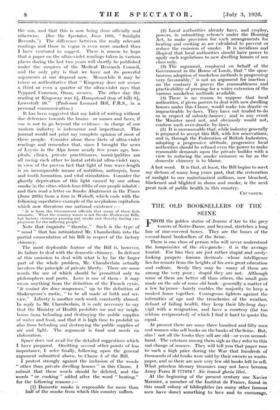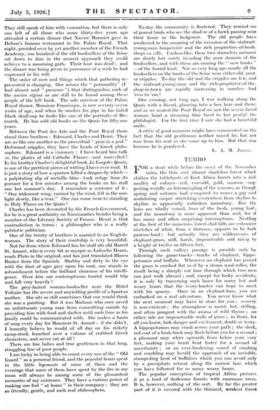THE OLD BOOKSELLERS OF. THE .
SEINE
FROM the golden statue of Jeanne d'Arc to the grey towers of Notre-Dame,- and- beyond, stretches a long line of zinc-covered boxes. They are the boxes of the second-hand booksellers of the Seine.
There is one class of person who will never understand the bouquinistes of the rive-gauche: it is the average tourist. For him they are just rather stupid and seedy- looking paup.ers—human decimals—whose intelligence lies far remote from the heights of his own great education and culture. Seedy they may be—many of them are among the very poor ; stupid they are not. Although some of them are better off than others, the small gain made on the sale of some old book—generally a matter of a few ha'pence—barely enables the majority to keep a modest home together. Courageous fighters against the infirmities of age and the treacheries of the weather, defiant of failing health, they keep their life-long day- vigil with a resignation, and have a courtesy (far too seldom reciprocated) of which I find it hard to quote the equal.
At present there are some three hundred and fifty men and women who sell books on the banks of the Seine. But, alas ! not all the books they sell are old—or even second, hand. The veterans among them sigh as they refer to this sad change of moeurs. They will tell you that paper rose- to such a high price during the War that hundreds of thousands of old books were sold by their owners as waste- paper, and so there are now very few old books left to sell. What priceless literary treasures may not have become Army Form B 777976! Sic transit gloria libri.
At the beginning of the present century one Xavier Marmier, a member of the Institut de France, found in this small colony of bibliophiles (as many other famous men have' done) something to love and to encourage. They still speak of him with veneration, but there is only one left of all those who some thirty-five years ago attended a certain dinner that Xavier Marmier gave in Detour's famous restaurant in the Palais Royal. That night, presided over by yet another member of the French Academy, one hundred of the old booksellers of the Seine sat down to dine in the nearest approach they could achieve to a mourning garb. Their host was dead ; and the dinner was being given in pursuance of a wish he had expressed in his will.
The order of men and things which that gathering re- presented is changing. One misses the " personality" (I had almost said "presence ") that distinguishes such of the ancien regime as are still to be found among these people of the left bank. The sole survivor of the Palais Royal dinner, Monsieur Francisque, is now seventy-seven years of age, and when he smokes his pipe in his faded black skull-cap he looks like one of the portraits of Bis- marck. He has sold old books on the Quais for fifty-one years.
Between the Pont des. Arts and the Pont Royal there stand three brothers : Edouard, Charles and Henri. They are as like one another as the proverbial "peas in a Deformed cripples, they have the heads of Greek philo- sophers. Edouard is a visionary : I have heard him talk an the glories of old Catholic France—and 'nuirvelled ! In his brother Charles's delightful book, Le Long des Quais, is one of the prettiest pieces of writing I have ever read. It is just a story of how a sparrow killed a dragon-fly which— a palpitating slip of metallic blue—took refuge from its pursuer for a few minutes among the books on his stall one hot summer's day. I remember a sentence of it : "One iridescent wing, carried by the wind, fell in the sun- light slowly, like a tear." One can come near to standing in Holy Places .on the Quais ! , .
Charles has been decorated by the French Government, for he is a great authority on Numismatics besides being a member of the Literary Society of France. Henri is that contradiction in terms : a philosopher who is a really patriotic politician.
One of the trinity of brothers is married to an English- woman. The story of their courtship is very beautiful.
Not far from where Edouard has his stall sits old Marcel St. Amant, who is every bit as myopic as Lafcadio Hearn, reads Plato in the original, and has just translated Blasco Ibanez from the Spanish. Shabby and dirty to the eye with the dust of ages grey upon his coat, one stands in astonishment before the brilliant clearness of his intelli- gence. Over him our contemptuous tourist would trip and fall very heavily !
The grey-haired woman-bookseller near the H8tel Voltaire has the severe and unyielding profile of a Spartan mother. She sits so still sometimes that one would think she was a painting. But it was Madame who once saved an nnfortunate .young man from committing suicide by providing him with food and shelter until such time as his family could be communicated with. She makes a basin of soup every day for Monsieur St. Amant : if she didn't, I honestly believe he would sit all day on • his rickety camp-stool, hunched over a volume of crabbed Greek characters, and never eat at all !
There are fine ladies and true gentlemen in that long, straggling line .of poor people.
I am lucky in being able to count every one of the " Old Guard "as. a personal friend, and the peaceful hours spent in the little logement8 of some of. them and the evenings that some of them have spent by the fire in my. room will always be among . some of the pleasantest mempries of my existence. They have a curious power of making one feel "at home" in their company : they are so friendly, gentle, and such real philosophers. To-day the community is flustered. They remind me of parent birds who see the shadow of a hawk passing near their home in the hedgerow. The old people have awakened in the meaning of the invasion of the stalwart- young-man bouquiniste and the rich proprietors-of-book. shops en vile. Cuckoo-like, these two shameless menaces are slowly but surely invading the poor domain of the booksellers, and with them are coming the " new books " —of the horrid kind. Not so very long ago nearly all the booksellers on the banks of the Seine were either old, poor, or cripples. To-day the old and the cripples arc few, and the stalwart-young-man and the rich-proprietor-of-the- shop-in-town are rapidly increasing in number—bad 'cess to 'em !
One evening, not long ago, I was walking along the Quais with a friend, glancing into a box here and there, and as we neared the Pont Royal we saw the severe-faced woman hand a steaming blue bowl to her protege the philologist. For the first time I saw she had a beautiful smile.
A critic of good manners might have commented on the fact that the old gentleman neither raised his hat nor rose from his seat as she came up to him. But that was because he is Paralysed.
L. A. M. Jos Es.











































 Previous page
Previous page